- Home
- Vladimir Nabokov
Glory
Glory Read online
BOOKS BY Vladimir Nabokov
NOVELS
Mary
King, Queen, Knave
The Luzhin Defense
The Eye
Glory
Laughter in the Dark
Despair
Invitation to a Beheading
The Gift
The Real Life of Sebastian Knight
Bend Sinister
Lolita
Pnin
Pale Fire
Ada, or Ardor: A Family Chronicle
Transparent Things
Look at the Harlequins!
The Original of Laura
SHORT FICTION
Nabokov’s Dozen
A Russian Beauty and Other Stories
Tyrants Destroyed and Other Stories
Details of a Sunset and Other Stories
The Enchanter
DRAMA
The Waltz Invention
Lolita: A Screenplay
The Man from the USSR and Other Plays
AUTOBIOGRAPHY AND INTERVIEWS
Speak, Memory: An Autobiography Revisited
Strong Opinions
BIOGRAPHY AND CRITICISM
Nikolai Gogol
Lectures on Literature
Lectures on Russian Literature
Lectures on Don Quixote
TRANSLATIONS
Three Russian Poets: Translations of Pushkin,
Lermontov, and Tiutchev
A Hero of Our Time (Mikhail Lermontov)
The Song of Igor’s Campaign (Anon.)
Eugene Onegin (Alexander Pushkin)
LETTERS
Dear Bunny, Dear Volodya:
The Nabokov-Wilson Letters, 1940–1971
Vladimir Nabokov: Selected Letters, 1940–1977
MISCELLANEOUS
Poems and Problems
The Annotated Lolita
FIRST VINTAGE INTERNATIONAL EDITION, NOVEMBER 1991
Copyright © 1971 by Article 3C Trust
under the Will of Vladimir Nabokov
All rights reserved under International and Pan-American Copyright Conventions. Published in the United States by Vintage Books, a division of Random House, Inc., New York, and distributed in Canada by Random House of Canada Limited, Toronto.
Originally published in hardcover by McGraw-Hill International, Inc.,
New York, in 1971. This edition published by arrangement with the Estate of Vladimir Nabokov.
Library of Congress Cataloging-in-Publication Data
Nabokov, Vladimir Vladimirovich, 1899–1977.
[Podvig. English]
Glory / Vladimir Nabokov; translated from the Russian by
Dmitri Nabokov in collaboration with the author.
—1st Vintage International ed.
p. cm.
Translation of: Podvig.
“Originally published … by McGraw-Hill International …
in 1971”—Verso of t.p.
eISBN: 978-0-307-78757-6
I. Title.
PG3476.N3P613 1991
891.73′42—dc20 91-50488
Cover art by Martin Venezky/Appetite Engineers
Cover photograph by Alison Gootee
v3.1
To Véra
Contents
Cover
Other Books by This Author
Title Page
Copyright
Dedication
Foreword
Chapter 1
Chapter 2
Chapter 3
Chapter 4
Chapter 5
Chapter 6
Chapter 7
Chapter 8
Chapter 9
Chapter 10
Chapter 11
Chapter 12
Chapter 13
Chapter 14
Chapter 15
Chapter 16
Chapter 17
Chapter 18
Chapter 19
Chapter 20
Chapter 21
Chapter 22
Chapter 23
Chapter 24
Chapter 25
Chapter 26
Chapter 27
Chapter 28
Chapter 29
Chapter 30
Chapter 31
Chapter 32
Chapter 33
Chapter 34
Chapter 35
Chapter 36
Chapter 37
Chapter 38
Chapter 39
Chapter 40
Chapter 41
Chapter 42
Chapter 43
Chapter 44
Chapter 45
Chapter 46
Chapter 47
Chapter 48
About the Author
Foreword
The present work closes the series of definitive English versions in which my entire set of nine Russian novels (written in Western Europe between 1925 and 1937, and published by émigré houses between 1926 and 1952) is available to American and British readers. He who cares to scan the list given below should mark the dramatic gap between 1938 and 1959:
Mashenka, 1926 (Mary, 1970)
Korol’, Dama, Valet, 1928 (King, Queen, Knave, 1968)
Zashchita Luzhina, 1930 (The Defense, 1964)
Soglyadatay, 1930 (The Eye, 1965)
Podvig, 1932 (Glory, 1971)
Kamera obscura, 1933 (Laughter in the Dark, 1938)
Otchayanie, 1936 (Despair, 1966)
Priglashenie na Kazn’, 1938 (Invitation to a Beheading, 1959)
Dar, 1952 (The Gift, 1963)
The present translation is meticulously true to the text. My son took three years, on and off, to make a first draft, after which I spent three months preparing a fair copy. The very Russian preoccupations with physical movement and gesture, walking and sitting, smiling and glancing from-under-the-brows, seems especially strong in Podvig, and this made our task still tougher.
Podvig was begun in May 1930, immediately after my writing Soglyadatay, and completed by the end of that year. My wife and I, who were then still childless, rented a parlor and bedroom on Luitpoldstrasse, Berlin West, in the vast and gloomy apartment of the one-legged General von Bardeleben, an old gentleman solely occupied in working out his family tree; his large brow had a somewhat Nabokovian cast, and, indeed, he was related to the well-known chess player Bardeleben, whose manner of death resembled that of my Luzhin. One day in early summer Ilya Fondaminski, chief editor of the Sovremennye Zapiski, arrived there from Paris to buy the book na kornyu, “in the rooted state” (said of grainfields before they are harvested). He was a Social-Revolutionist, a Jew, a fervent Christian, a learned historian, and an altogether delightful man (later murdered by the Germans in one of their extermination camps), and vividly do I remember the splendid zest with which he slapped his knees before rising from our grim green divan after the deal had been clinched!
The book’s—certainly very attractive—working title (later discarded in favor of the pithier Podvig, “gallant feat,” “high deed”) was Romanticheskiy vek, “romantic times,” which I had chosen partly because I had had enough of hearing Western journalists call our era “materialistic,” “practical,” “utilitarian,” etc., but mainly because the purpose of my novel, my only one with a purpose, lay in stressing the thrill and the glamour that my young expatriate finds in the most ordinary pleasures as well as in the seemingly meaningless adventures of a lonely life.
It would make things too easy for a certain type of reviewer (and particularly for those insular innocents whom my work affects so oddly that one might think I hypnotize them from the wings into making indecent gestures) were I to point out the faults in the novel. Suffice it to say that, after all but lapsing into false exotism or commonplace comedy, it soars to heights of purity and
melancholy that I have only attained in the much later Ada.
How do the main characters of Glory stand in relation to those of my other fourteen (Russian and American) novels?—the human-interest seeker may ask.
Martin is the kindest, uprightest, and most touching of all my young men; and little Sonia, of the lusterless dark eyes and coarse-looking black hair (her father, judging by his name, had Cheremissian blood), should be acclaimed by experts in amorous lure and lore as being the most oddly attractive of all my young girls, although obviously a moody and ruthless flirt.
If Martin to some extent can be considered a distant cousin of mine (nicer than I, but also much more naive than I ever was), with whom I share certain childhood memories, certain later likes and dislikes, his pallid parents, per contra, do not resemble mine in any rational sense. As to Martin’s Cambridge friends, Darwin is totally invented, and so is Moon, but “Vadim” and “Teddy” existed in the reality of my own Cambridge past: they are mentioned under their initials, N.R. and R.C., respectively, in my Speak, Memory, 1966, Chapter Thirteen, penult paragraph. The three staunch patriots, dedicated to counter-Bolshevist work, Zilanov, Iogolevich, and Gruzinov, belong to that group of people, politically situated just to the right of the old Terrorists and just to the left of the Constitutional Democrats, and as far from Monarchists on one side as from Marxists on the other, whom I was well acquainted with in the entourage of the very magazine which serialized Podvig, but none is an exact portrait of a specific individual. I feel obliged to give here the proper determination of this political type (recognized at once, with the unconscious precision of common knowledge, by the Russian intelligent who was the main reader of my books) because I still cannot reconcile myself to the fact—deserving to be commemorated by an annual pyrotechnical display of contempt and sarcasm—that in the meantime American intellectuals had been conditioned by Bolshevist propaganda into utterly disregarding the vigorous existence of liberal thought among Russian expatriates. (“You’re a Trotskyite, then?” brightly suggested an especially limited left-wing writer, in New York, 1940, when I said I was neither for the Soviets nor for any Tsar.)
The hero of Glory, however, is not necessarily interested in politics—that is the first of two mastertricks on the part of the wizard who made Martin. Fulfillment is the fugal theme of his destiny; he is that rarity—a person whose “dreams come true.” But the fulfillment itself is invariably permeated by poignant nostalgia. The memory of the childish reverie blends with the expectation of death. The perilous path that Martin finally follows into forbidden Zoorland (no connection with Nabokov’s Zembla!) only continues to its illogical end the fairy-tale trail winding through the painted woods of a nursery-wall picture. “Fulfillment” would have been, perhaps, an even better title for the novel: Nabokov cannot be unaware that the obvious translation of podvig is “exploit,” and, indeed, it is under that title that his Podvig is listed by bibliographers; but if you once perceive in “exploit” the verb “utilize,” gone is the podvig, the inutile deed of renown. The author chose therefore the oblique “glory,” which is a less literal but much richer rendering of the original title with all its natural associations branching in the bronze sun. It is the glory of high adventure and disinterested achievement; the glory of this earth and its patchy paradise; the glory of personal pluck; the glory of a radiant martyr.
Nowadays, when Freudism is discredited, the author recalls with a whistle of wonder that not so long ago—say before 1959 (i.e., before the publication of the first of the seven forewords to his Englished novels)—a child’s personality was supposed to split automatically in sympathetic consequence of parental divorce. His parents’ separation has no such effect on Martin’s mind, and only a desperate saphead in the throes of a nightmare examination may be excused for connecting Martin’s plunge into his fatherland with his having been deprived of his father. No less reckless would it be to point out, with womby wonder, that the girl Martin loves and his mother bear the same name.
My second wand-stroke is this: among the many gifts I showered on Martin, I was careful not to include talent. How easy it would have been to make him an artist, a writer; how hard not to let him be one, while bestowing on him the keen sensitivity that one generally associates with the creative creature; how cruel to prevent him from finding in art—not an “escape” (which is only a cleaner cell on a quieter floor), but relief from the itch of being! The temptation to perform my own little exploit within the omnibus nimbus prevailed. The result reminds me of a chess problem I once composed. Its beauty lay in a paradoxical first move: the White Queen had four likely squares at its disposal but on any of these it would be in the way (such a powerful piece—and “in the way”!) of one of White’s Knights in four mating variants; in other words, being an absolutely useless spoilsport and burden on the board, with no part whatever in any of the subsequent play, it had to exile itself to a neutral corner behind an inert pawn and remain wedged there in idle obscurity. The problem was diabolically difficult to construct. So was Podvig.
The author trusts that wise readers will refrain from avidly flipping through his autobiography Speak, Memory in quest of duplicate items or kindred scenery. The fun of Glory is elsewhere. It is to be sought in the echoing and linking of minor events, in back-and-forth switches, which produce an illusion of impetus: in an old daydream directly becoming the blessing of the ball hugged to one’s chest, or in the casual vision of Martin’s mother grieving beyond the time-frame of the novel in an abstraction of the future that the reader can only guess at, even after he has raced through the last seven chapters where a regular madness of structural twists and a masquerade of all characters culminate in a furious finale, although nothing much happens at the very end—just a bird perching on a wicket in the grayness of a wet day.
VLADIMIR NABOKOV
December 8, 1970
Montreux
1
Funny as it may seem, Martin’s grandfather Edelweiss was a Swiss—a robust Swiss with a fluffy mustache, who in the 1860’s had been tutor to the children of a St. Petersburg landowner named Indrikov, and had married his youngest daughter. Martin assumed at first that the velvety white Alpine flower, that pet of herbariums, had been named in honor of his grandfather. Even later he could not fully relinquish this notion. He remembered his grandfather distinctly, but only in one form and position: a corpulent old man, dressed completely in white, fair-whiskered, wearing a Panama hat and a piqué waistcoat rich in breloques (the most amusing of which was a dagger the size of a fingernail), sitting on a bench in front of the house in a linden’s mobile shade. It was on this very bench that his grandfather had died, holding in the palm of his hand his beloved gold watch, whose lid was like a little golden mirror. Apoplexy overtook him during this timely gesture and, according to family legend, the hands stopped at the same moment as his heart.
For many years after, Grandfather Edelweiss was preserved in a massive leather album; in his day photographs were made tastefully, with elaborate deliberation. The operation was no joking matter; the patient had to be immobilized for a long time, and permission to smile had yet to come—with the advent of the snapshot. The complexity of heliography accounted for the weightiness and solidity of Grandfather’s manly poses in those somewhat pale but very good-quality pictures: Grandfather as a youth with a freshly killed woodcock at his feet; Grandfather astride the mare Daisy; Grandfather on a striped veranda seat, with a black dachshund that had refused to sit still, and had come out with three tails in the photograph. Only in 1918 did Grandfather Edelweiss disappear altogether, for the album went up in flames, as did the table where the album lay, and, in fact, the whole country house, which the peasant chaps from the nearby village foolishly burned to the ground as it stood, instead of realizing a profit from the furnishings.
Martin’s father was a dermatologist, and a famous one. Like Grandfather, he too was very white-skinned and stout, enjoyed fishing for gobies in his spare time, and possessed a magnificent collec
tion of daggers and sabers, as well as long, strange pistols, on account of which the users of more modern weapons nearly sent him before the firing squad. In the beginning of 1918 he grew bloated and short of breath, and died around March 10 in unclear circumstances. His wife Sofia and their son were living at the time near Yalta: the town kept trying on now one regime, now another, and could not make up its finicky mind.
She was a rosy, freckled, youthful woman, with pale hair in a big bun, high eyebrows that were thickish toward the bridge of her nose and nearly imperceptible toward her temples, and little slits (once made for now absent earrings) in the elongated lobes of her delicate ears. Only recently, in their Northern country place, she still used to play a powerful, agile game of tennis on the garden court, which had been in existence since the eighties. In the autumn she would spend a lot of time riding a black Enfield bicycle along the avenues of their park, across noisily rustling carpets of dry leaves. Or else she would set out on foot along the resilient shoulder of the highway and cover the long way, dear to her since childhood, from Olkhovo to Voskresensk, raising and lowering the end of her expensive coral-knobbed cane like a seasoned walker. In St. Petersburg she was known as an Anglomaniac, and relished this fame—she would discuss eloquently such topics as Boy Scouts or Kipling, and found a quite special delight in frequent visits to Drew’s English Shop where, still on the stairs, before a large poster (a woman thickly lathering a boy’s head) you were greeted by a wonderful smell of soap and lavender, with something more mixed in, something that suggested collapsible rubber tubs, soccer balls, and round, heavy, tightly swaddled Christmas puddings. It follows that Martin’s first books were in English: his mother loathed the Russian magazine for children Zadushevnoe Slovo (The Heartfelt Word), and inspired in him such aversion for Madame Charski’s young heroines with dusky complexions and titles that even much later Martin was wary of any book written by a woman, sensing even in the best of such books an unconscious urge on the part of a middle-aged and perhaps chubby lady to dress up in a pretty name and curl up on the sofa like a pussy cat. Sofia detested diminutives, kept a strict check on herself so as not to use them, and was annoyed if her husband said “Sonny’s got the coughikins again—let’s check his temperaturka”: Russian children’s literature swarmed with cute lisping words, when not committing the sin of moralizing.

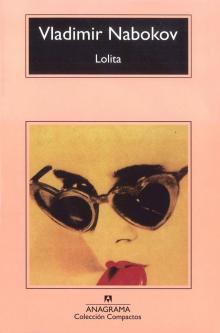 Lolita
Lolita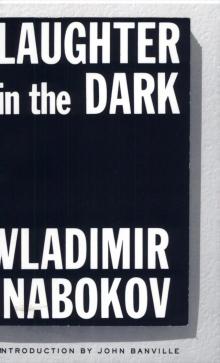 Laughter in the Dark
Laughter in the Dark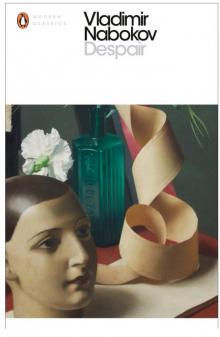 Despair
Despair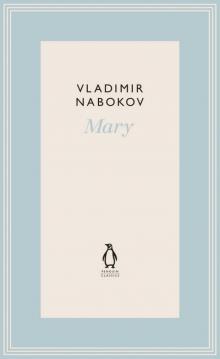 Mary
Mary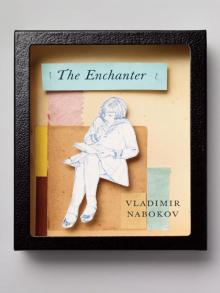 The Enchanter
The Enchanter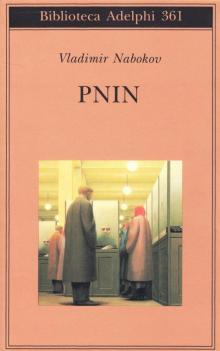 Pnin
Pnin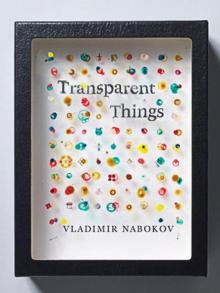 Transparent Things
Transparent Things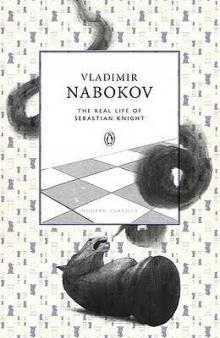 The Real Life of Sebastian Knight
The Real Life of Sebastian Knight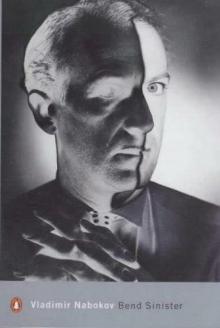 Bend Sinister
Bend Sinister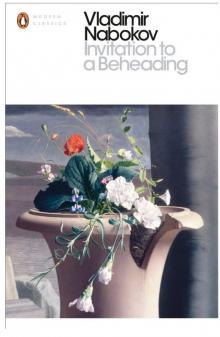 Invitation to a Beheading
Invitation to a Beheading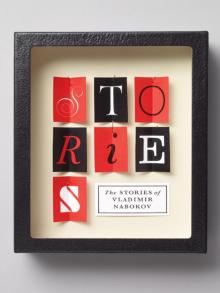 The Stories of Vladimir Nabokov
The Stories of Vladimir Nabokov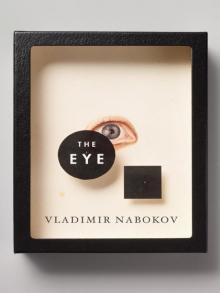 The Eye
The Eye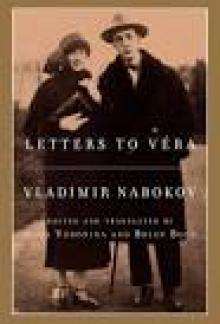 Letters to Véra
Letters to Véra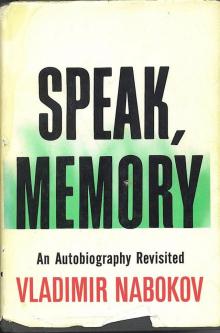 Speak, Memory
Speak, Memory The Gift
The Gift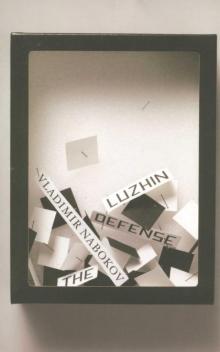 The Luzhin Defense
The Luzhin Defense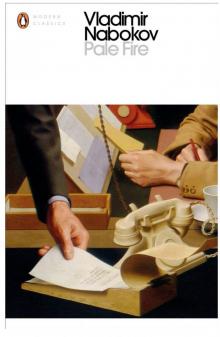 Pale Fire
Pale Fire Glory
Glory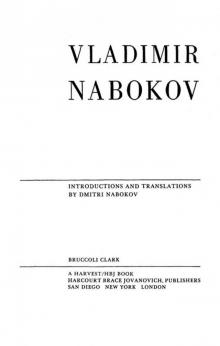 Man From the USSR & Other Plays
Man From the USSR & Other Plays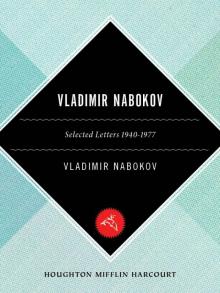 Vladimir Nabokov: Selected Letters 1940-1977
Vladimir Nabokov: Selected Letters 1940-1977 Strong opinions
Strong opinions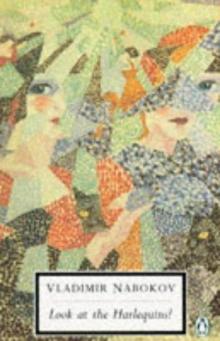 Look at the Harlequins!
Look at the Harlequins!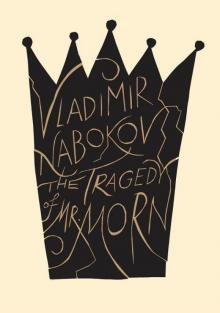 The Tragedy of Mister Morn
The Tragedy of Mister Morn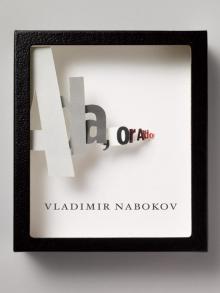 Ada, or Ardor
Ada, or Ardor Lectures on Russian literature
Lectures on Russian literature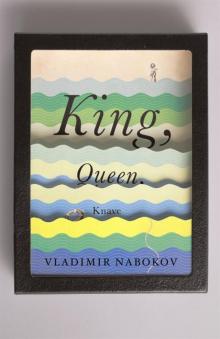 King, Queen, Knave
King, Queen, Knave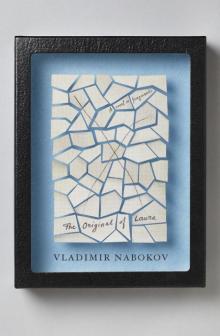 The Original of Laura
The Original of Laura